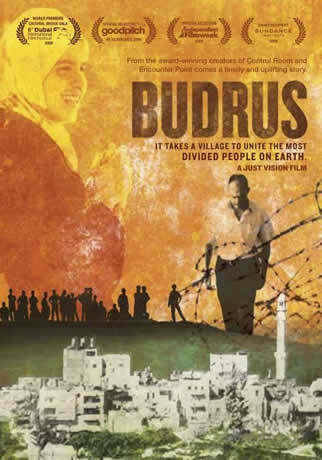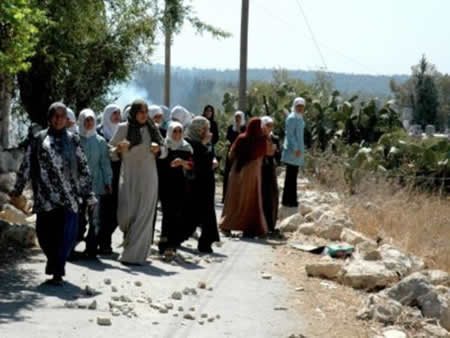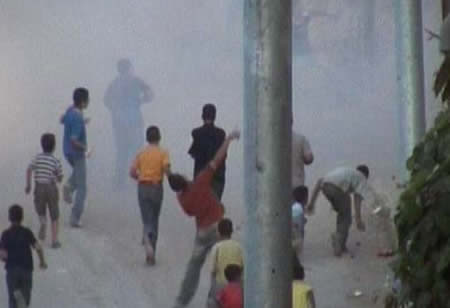 Budrus follows Palestinian community organizer Ayed Morrar as he unites local Fatah and Hamas members along with Israeli supporters in an unarmed movement to save his village of Budrus from destruction by Israel’s Separation Barrier. “Budrus” chronicles this movement from its infancy and shines a light on people who choose nonviolence. This film has received some great political press.
Budrus follows Palestinian community organizer Ayed Morrar as he unites local Fatah and Hamas members along with Israeli supporters in an unarmed movement to save his village of Budrus from destruction by Israel’s Separation Barrier. “Budrus” chronicles this movement from its infancy and shines a light on people who choose nonviolence. This film has received some great political press.
Here is CWB’s interview with Julia Bacha, director of Budrus
Bijan Tehrani: How did you come up with the idea of making Budrus?
Julia Bacha: I have been working with an organization called Just Vision for seven years now, and we’ve been researching and documenting the work of Palestinian and Israeli civic leaders who are trying to end the conflict using non-violent means. We decided to do the story of Budrus because we often get the question in the United States and Israel about why Palestinians do not revert to non-violence; we knew that the situation on the ground was a bit more complex and that there were non-violent groups and non-violent efforts being made, but they were facing invisibility and the national community was not paying attention to them. Budrus’ story was one that was needed to be told because it encapsulated a lot of the various bridges that non-violent resistance allows you to cross. They allow you to unite all political parties; it allowed them to put women on the front lines and many different people were then allowed joining in to the struggle.
BT: How challenging was it to make this film?
JB: As I mentioned before, I have a team that has been working on the ground for several years and we have credibility for telling this story. Out last film was called Encounter Point , which followed bereaved families or people that had lost family members to conflict and were now working together to find different ways to end the conflict—so, we weren’t just jumping in and trying to figure out for the first time how things work. It is challenging because there is no occupation, so you often need to be flexible with your schedule because you always have to be aware of when the checkpoints are closed and when the banks are completely under closure for different reasons. The security is very heavy at the airports and oftentimes they do not want to let in filmmakers or journalists. Overall, this was a comparatively typical challenge of a documentary filmmaker. One of our main challenges was, of course, the financing; we had to go through several different film funds in order to help support the film.
BT: How have audiences reacted to this film, especially in Palestine and Israel?
JB: We opened the film at the Dubai International Film Festival in December 2009. We were one of the gala films and the other film was Avatar, so we got to get quite a bit of visibility at that festival. We then opened  at the Berlin International Film Festival and we won the second prize of the Audience Award and we were incredibly honored to receive such a prestigious prize at such a notable film festival. We then had our North American premiere at the Tribeca film festival, where we won the special Jury mention. We then went to the San Francisco International Film Festival where we won the Audience Award and we kept on going: right now it has been ten months of film festivals. The last award that we received was actually one of the most meaningful ones. At the Jerusalem International Film Festival, where we opened this July, we had our first opportunity to screen the film to an Israeli audience and we won the Special Mention of Freedom prize. The film is now actually playing at the cinemas in Israel; we are playing in Tel-Aviv and we are playing in Jerusalem. In the Palestinian territory, we had our official premiere at the Ramala Cultural Palace in July with 800 people. It was a completely sold out screening and we had members of the Palestinian authority come and we had leaders from all across the West Bank from the different political parties. The women came out, the political activists came out, and it was a really beautiful and inspired screening that has led to over forty invitations from across the West Bank to screen the film. So we are going from village to village, refugee camp to refugee camp, screening this story and many of the communities are using the same tactics to sway people to the ideas of non-violence.
at the Berlin International Film Festival and we won the second prize of the Audience Award and we were incredibly honored to receive such a prestigious prize at such a notable film festival. We then had our North American premiere at the Tribeca film festival, where we won the special Jury mention. We then went to the San Francisco International Film Festival where we won the Audience Award and we kept on going: right now it has been ten months of film festivals. The last award that we received was actually one of the most meaningful ones. At the Jerusalem International Film Festival, where we opened this July, we had our first opportunity to screen the film to an Israeli audience and we won the Special Mention of Freedom prize. The film is now actually playing at the cinemas in Israel; we are playing in Tel-Aviv and we are playing in Jerusalem. In the Palestinian territory, we had our official premiere at the Ramala Cultural Palace in July with 800 people. It was a completely sold out screening and we had members of the Palestinian authority come and we had leaders from all across the West Bank from the different political parties. The women came out, the political activists came out, and it was a really beautiful and inspired screening that has led to over forty invitations from across the West Bank to screen the film. So we are going from village to village, refugee camp to refugee camp, screening this story and many of the communities are using the same tactics to sway people to the ideas of non-violence.
BT: How much do you think this film will help lighten the very dark image that is portrayed of the conflict in the Middle East by the media?
JB: I think that people are incredibly fatigued by the Israeli and Palestinian conflict and I think that many people believe that the conflict is hopeless. I think that this film is bringing a lot of hope to Israelis and Palestinians, as well as Americans and Europeans. I think that in the Arab world, the reactions are that people have never had access to the Israeli activists that are working with people in Palestine in order to find a non-violent resolution and to end the occupation. All they see is Israel in a very monolithic sense, and there is not a real exploration of what Israeli society is and they do not see the Israelis that are risking their lives in order to end the occupation. I think that there are so many elements of this story of the stereotypes across the world of who the Israelis are and  who the Palestinians are, and this film shows that peace is possible and that when people get together and have a common goal then extraordinary things can happen.
who the Palestinians are, and this film shows that peace is possible and that when people get together and have a common goal then extraordinary things can happen.
BT: Do you think that this film can help with the peace talks that are happening right now in the Middle East?
JB: I have been talking to lots of people on the ground and they feel very apart and alienated by the peace process that is going on. In order for peace to work, it has to be involved from the grassroots level, and what is currently happening has almost no relationship whatsoever to where civil society is. Both sides need to be actively amending and need to be reached out to by their leaders. It is the people that are going to live through them and find people that are willing to bring an end to the conflicts through negotiations in order to find peace.
BT: What is the next step for this film and do you have any future projects lined up?
JB: I am currently in Los Angeles for the theatrical release of this film. We are currently playing at the Quad Theatre in New York City and we will also be opening in Denver this week. I will then be going on to Minneapolis, Boston, Seattle, Berkeley, San Francisco, and several other cities. We will be going all over the country and the list of the cities that we will be visiting will be posted on our website, which is http://www.justvision.org. The film will run in Israel and Palestine for probably another year, and I am currently looking for other stories to be told from this region.

